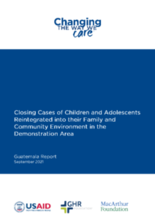From June to November 2019, CTWWC caseworkers analyzed, assessed, and investigated the files of the children living in residential care in the Temporary Early Childhood Orphanage in Zacapa. They started working on several cases based on the methodology described in more detail in the Application of the Case Management Methodology Process developed in 202019 . They also conducted trainings on the case management methodology in Zacapa, Guatemala.
In January 2020, CTWWC psychosocial team identified five more cases of 17 children (8 girls and 7 boys from ages 3-16) through the privately-run orphanage Esperanza de Vida in Zacapa. Caseworkers began working these cases through the case management process. Thus far, 11 out of these 17 children have reunified with their birth or extended family, two children were prevented from separation from their family, and the last case of four siblings did not end in reintegration despite caseworkers' accompaniment and family preparation for 20 months. First, because the children did not wish to return to their family and the Child and Youth Court prioritized their opinion after the family failed to make the changes related to household hygiene or relocation that the judge had requested. Second, caseworkers identified security issues in the neighborhood where the family lived, which added to the little willingness of the family to care for their children, represented a high risk for the children to stay with them. No other family option was found, so these four children continue living in the orphanage. In the end, four out of the five cases found through Esperanza de Vida residential facilities were closed.
Below is a summary of the closure of 12 cases (15 boys and 9 girls) of the 13 cases identified in 2019 and 2020 in the Temporary Early Childhood and the Esperanza de Vida orphanages in Zacapa. Using the case management process (which included an in-depth analysis of the Care Plans, follow-up forms, and the reintegration criteria), caseworkers determined that reintegrating 24 children into their family environment was feasible as they provided a safe and stable place for their emotional and physical development. As explained above, caseworkers exhausted family tracing efforts for one case, so four siblings were not reunified with their family.

